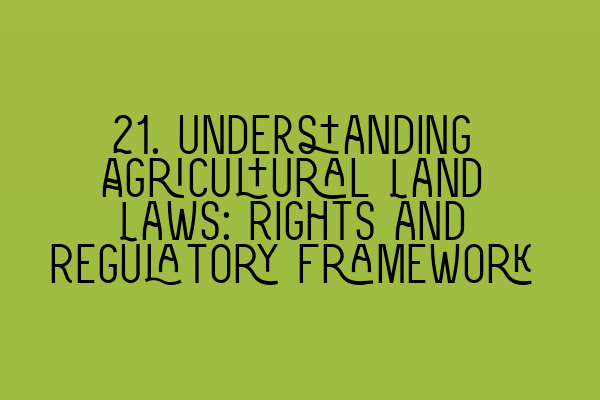21. Understanding Agricultural Land Laws: Rights and Regulatory Framework
When it comes to agricultural land, understanding the rights and regulatory framework is essential for both landowners and those looking to enter the agricultural sector. Agricultural land laws have a significant impact on how land is used, managed, and transferred. In this article, we will delve into the intricacies of agricultural land laws, covering various rights and the regulatory framework surrounding agricultural land.
1. Ownership of Agricultural Land
Ownership of agricultural land is a crucial aspect of understanding agricultural land laws. Agricultural land can be owned by individuals, partnerships, corporations, or even public bodies. The ownership of the land determines the rights and responsibilities that come with it.
When it comes to ownership, it’s important to consider factors such as title deeds, easements, and covenants that may affect the land. Additionally, there may be restrictions on the use of the land imposed by local planning authorities or conservation bodies. Understanding the ownership rights and restrictions is essential for anyone involved in agricultural land transactions.
If you are preparing for the SQE exams, make sure to check out our SQE 1 practice exam questions and SQE 1 practice mocks FLK1 FLK2 articles for comprehensive exam preparation.
2. Agricultural Tenancies and Leases
Agricultural tenancies and leases play a crucial role in the agricultural sector. These agreements allow individuals to occupy and use agricultural land for specific purposes such as farming, grazing, or horticulture. Understanding the rights and obligations of both landlords and tenants is pivotal for a successful tenancy or lease.
Agricultural tenancies are governed by specific laws and regulations, such as the Agricultural Tenancies Act 1995 in England and Wales. These laws protect both landlords and tenants and provide guidelines for rent reviews, termination of tenancies, and dispute resolution.
If you are interested in learning more about agricultural tenancies and leases, our SQE 2 preparation courses can provide in-depth knowledge and guidance.
3. Common Agricultural Policy (CAP)
The Common Agricultural Policy (CAP) is a regulatory framework established by the European Union (EU) to govern agricultural practices and provide financial support to farmers. Although the United Kingdom has officially left the EU, CAP regulations continue to apply during the transition period.
The CAP sets out rules and regulations regarding issues such as land use, animal welfare, environmental protection, and market support. It also provides subsidies and grants to support farmers and agricultural activities. Understanding how the CAP affects agricultural land and complying with its regulations is crucial for farmers and landowners.
4. Environmental Stewardship
With an increasing focus on environmental sustainability and conservation, agricultural land laws have placed significant emphasis on environmental stewardship. Environmental stewardship schemes aim to incentivize farmers and landowners to adopt environmentally friendly practices on their land.
These schemes, such as the Countryside Stewardship Scheme, provide financial incentives to farmers for undertaking practices that enhance biodiversity, protect water quality, and promote sustainable land management. Compliance with environmental stewardship requirements is vital for accessing these incentives and ensuring the long-term sustainability of agriculture.
5. Agricultural Land and Inheritance
When it comes to agricultural land and inheritance, special considerations apply. The laws surrounding inheritance of agricultural land can differ from general inheritance laws, aiming to promote family farming and prevent fragmentation of agricultural holdings.
For individuals looking to transfer agricultural land through inheritance, it’s essential to understand the specific regulations regarding agricultural property relief, succession planning, and inheritance tax. Seeking legal advice from a specialist property solicitor is advisable in such cases to navigate the complexities of agricultural inheritance laws.
For more information on preparing for the SQE exams, including exam dates and preparation courses, visit our SQE 1 preparation courses and SRA SQE exam dates articles.
Conclusion
Understanding agricultural land laws is crucial for anyone involved in agricultural land transactions or working in the agricultural sector. From ownership rights to regulatory frameworks, these laws govern the use, management, and transfer of agricultural land. By familiarizing yourself with the rights and regulatory framework surrounding agricultural land, you can navigate the complexities of the agricultural sector and protect your interests.
If you require legal advice or assistance with agricultural land matters, our team of expert property solicitors at SQE Property Law & Land Law are here to help. Contact us today to discuss your needs.
